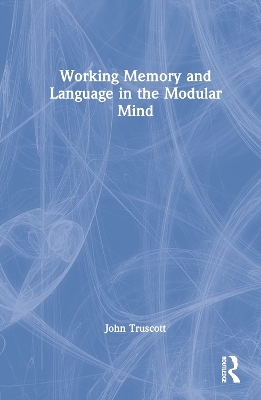
Working Memory and Language in the Modular Mind
Seiten
2022
Routledge (Verlag)
978-0-367-74496-0 (ISBN)
Routledge (Verlag)
978-0-367-74496-0 (ISBN)
The book explores two fundamental aspects of the human mind and their relation to one another.The aim of the book is to explore this relation between working memory and modularity, first in general terms and then using a specific modular view of the mind – the Modular Cognition Framework.
The book explores two fundamental aspects of the human mind and their relation to one another. The first is the way that information is put to use in the mind. When we are doing a mental arithmetic problem, for example, how do we bring the relevant bits of information to mind and hold them there while carrying out the series of calculations? This is working memory, the subject of an enormous research literature in psychology, neuroscience, and a great many other disciplines. Characterizing the working memory process is now a major part of efforts to understand the human mind. How we characterize this process depends of course on how we characterize the human mind as a whole. In particular, is the mind made up of a number of distinct units, each carrying out a specialized function? There is considerable reason to say that it is, and this modular view of the mind has become prominent in a great deal of academic work, notably in cognitive neuroscience, with important implications for our understanding of how working memory works. But these implications have received surprisingly little consideration to this point. The aim of the book is to explore this relation between working memory and modularity, first in general terms and then using a specific modular view of the mind – the Modular Cognition Framework. The ideas are illustrated and further developed through an application to language and especially second language acquisition and use.
The book explores two fundamental aspects of the human mind and their relation to one another. The first is the way that information is put to use in the mind. When we are doing a mental arithmetic problem, for example, how do we bring the relevant bits of information to mind and hold them there while carrying out the series of calculations? This is working memory, the subject of an enormous research literature in psychology, neuroscience, and a great many other disciplines. Characterizing the working memory process is now a major part of efforts to understand the human mind. How we characterize this process depends of course on how we characterize the human mind as a whole. In particular, is the mind made up of a number of distinct units, each carrying out a specialized function? There is considerable reason to say that it is, and this modular view of the mind has become prominent in a great deal of academic work, notably in cognitive neuroscience, with important implications for our understanding of how working memory works. But these implications have received surprisingly little consideration to this point. The aim of the book is to explore this relation between working memory and modularity, first in general terms and then using a specific modular view of the mind – the Modular Cognition Framework. The ideas are illustrated and further developed through an application to language and especially second language acquisition and use.
John Truscott is Professor Emeritus at the Institute of Learning Sciences and Technology, National Tsing Hua University, Taiwan
1. Introduction. 2. Working Memory: A Perspective on the State of the Field. 3. The Modular Mind, and the Place of Working Memory. 4. Multiple Working Memories: A Distinct Working Memory for Each Module. 5. Working Memory Across Modules: Activation and Coordination of Activity. 6. The Modular Cognition Framework. 7. Working Memory in the Framework. 8. Working Memory and Language. 9. Conclusion. References. List of Figures. Acknowledgements. List of Abbreviations.
| Erscheinungsdatum | 07.06.2022 |
|---|---|
| Zusatzinfo | 13 Line drawings, black and white; 13 Illustrations, black and white |
| Verlagsort | London |
| Sprache | englisch |
| Maße | 156 x 234 mm |
| Gewicht | 453 g |
| Themenwelt | Geisteswissenschaften ► Psychologie ► Allgemeine Psychologie |
| Geisteswissenschaften ► Psychologie ► Biopsychologie / Neurowissenschaften | |
| Geisteswissenschaften ► Psychologie ► Entwicklungspsychologie | |
| Geisteswissenschaften ► Sprach- / Literaturwissenschaft ► Sprachwissenschaft | |
| Naturwissenschaften ► Biologie ► Humanbiologie | |
| Naturwissenschaften ► Biologie ► Zoologie | |
| ISBN-10 | 0-367-74496-1 / 0367744961 |
| ISBN-13 | 978-0-367-74496-0 / 9780367744960 |
| Zustand | Neuware |
| Informationen gemäß Produktsicherheitsverordnung (GPSR) | |
| Haben Sie eine Frage zum Produkt? |
Mehr entdecken
aus dem Bereich
aus dem Bereich
Techniken der Verhaltenstherapie
Buch (2024)
Julius Beltz GmbH & Co. KG (Verlag)
CHF 48,95


